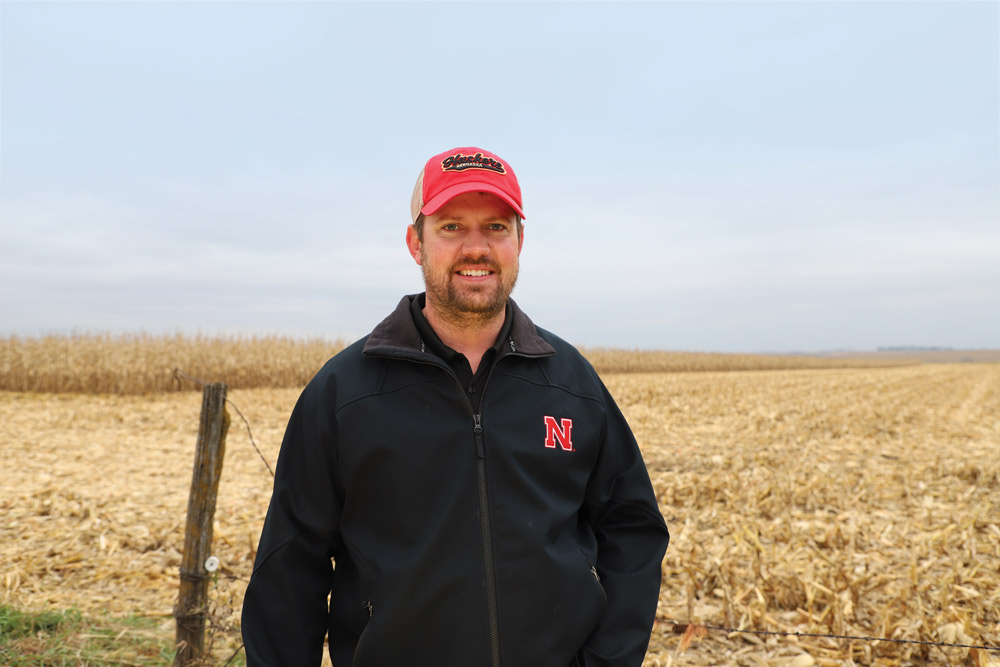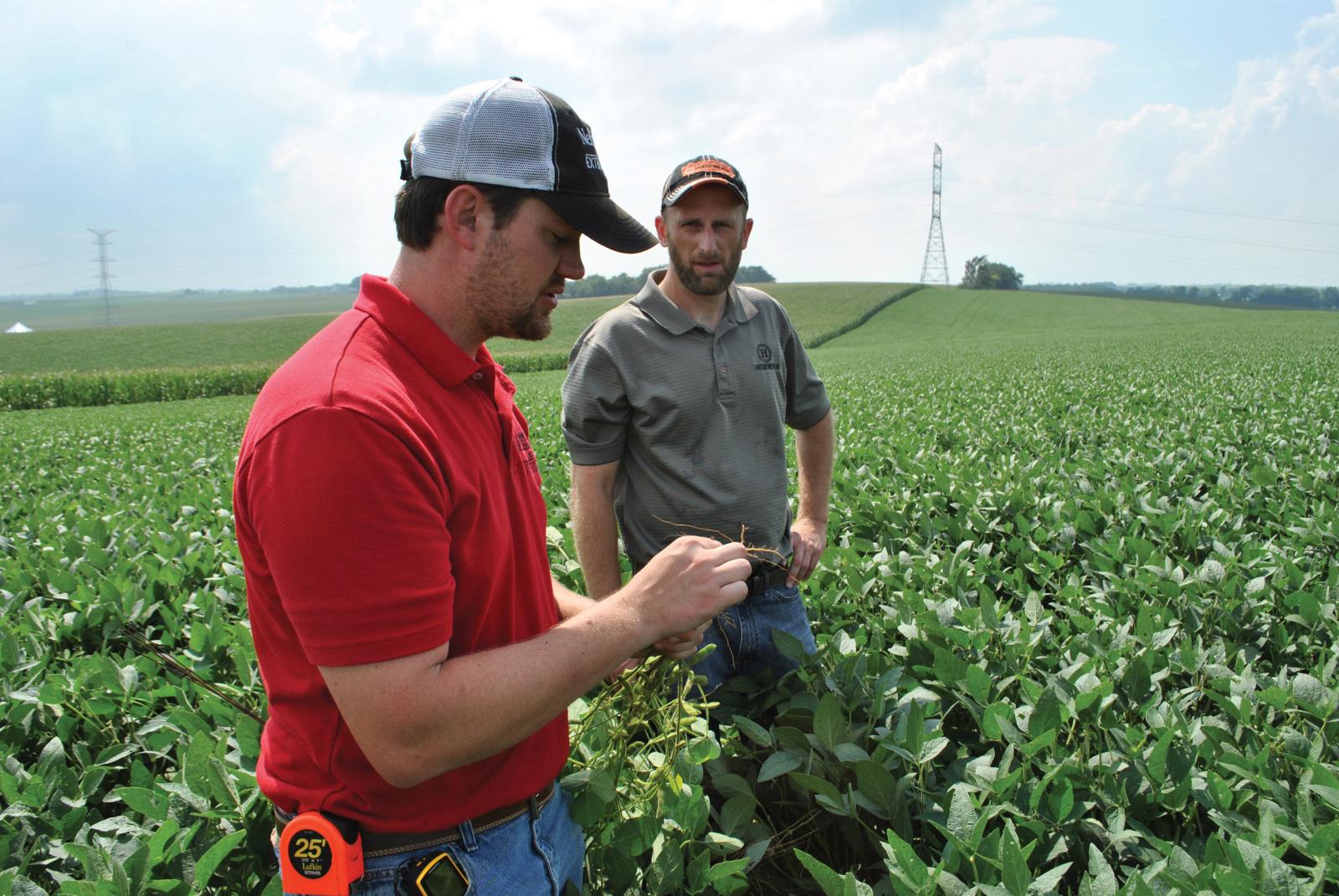
Trained as a scientist, Mueller said he can’t overstate the importance of communication skills in his day-to-day work. “I find myself writing, listening and speaking more than I ever anticipated.”
Nebraska Extension: The intersection of agriculture and education
And, for Nathan Mueller, the road home
Extension educator Nathan Mueller grew up on a 1,200-acre dairy farm near Winslow, Nebraska. His family also grew alfalfa, oats, corn and soybeans. “I usually helped out by fixing fence and hauling manure,” Mueller said. “But my parents prioritized education. For me, it was school, then sports, then the farm.”
Beginning the journey with Nebraska
With such an emphasis on education, it’s no surprise that Mueller left the family farm for college in Lincoln. Mueller earned two degrees from Nebraska: a bachelor’s in 2005 and a master’s in 2007. When it came to deciding on a major, Mueller opted for agronomy both times. He said he thought farming would give him more days off than his dad had milking cows.
Mueller remembers the moment when he first contemplated graduate school. He was in Soils 366 and his professor, perhaps observing his potential as a scientist, asked him if he ever thought about continuing on for a master’s degree. That professor was Martha Mamo, and she, as well as her husband Daniel Ginting, served on Mueller’s committee for his thesis. With a grant from the Department of Environmental Quality, Mueller assessed streambank erosion, including phosphorus movement, of the Wagon Train watershed.
Seeking experience across the Midwest
In 2006 Mueller married his wife Ashley. From 2007 to 2009 while she pursued her master’s at Purdue University, Mueller worked for the Soil Conservation Division of the Indiana State Department of Agriculture as a resource specialist team leader.
The next stop for the couple was Manhattan, Kansas, where Mueller earned his Ph.D. in agronomy from Kansas State University in 2012. His dissertation focused on soil fertility for corn and soybeans.
For two years, Mueller was an assistant professor and extension agronomist at South Dakota State University in Brookings. There, he came to realize that he most enjoyed the interaction with producers on the extension side of the job. The extension position was statewide, though, and Mueller found himself putting on a lot of miles as he traveled the state.
Returning home via extension opportunities
When an opportunity with Nebraska Extension became available in the region where Mueller grew up, he didn’t hesitate to come home. Now he’s a cropping systems extension educator for Dodge and Washington counties. He and Ashley along with their two sons, Garrison and Kase, live across the street from the high school in Fremont and less than 10 minutes from the Dodge County Extension Office, where the Muellers work. “It’s hard to believe we’ve been here going on 5 years. That’s more than twice as long as we lived anywhere else,” he said.
When Mueller joined Nebraska Extension in June 2014, his job description included an agricultural technology element. So he created the Crop Tech Cafe, an online resource for producers and a mechanism for Mueller to disseminate information quickly. The blog’s tagline “Know your crop, know your tech, know your bottom line . . . feeding you agronomic information for your farm in northeast Nebraska” sums up its audience, content and purpose. While reorganization within Nebraska Extension moved responsibility for ag tech to one of 18 statewide issue teams, Mueller continues to manage the site at croptechcafe.org, which includes local weather reports, grain bids, cash rent rates, Twitter feeds for Mueller and fellow extension educator Aaron Nygren, loads of information on cropping systems and precision ag data management, and occasional surveys (the latest is about seeding a cover crop).
One page of the blog, titled Winter Wheat Cafe, provides extensive resources for farmers thinking about adding this crop to their rotation. It’s an idea that’s gaining traction in northeast Nebraska. “We’ve gone from two farmers planting wheat to seven, and the number of acres has increased from 50 to 250,” he said. Having worked with winter wheat in Kansas and South Dakota, Mueller has the expertise to help local producers maximize their profitability.
Mueller estimates that 90–95 percent of his job is programming. “My busy time is December through March. That’s my planting season,” he said. One of the biggest education events he organizes is the annual Fremont Corn Expo, a free event attended by hundreds of area producers. One of the presentations at this year’s expo was Hail Know—a title developed by Mueller’s wife, who is a disaster recovery coordinator for Nebraska Extension and occasionally works with Mueller on projects related to natural disasters that affect agriculture, such as hail storms.
During the spring and fall when producers are in the field, Mueller’s focus shifts to site visits and on-farm research. One team that benefits from Mueller’s expertise is Project SENSE. Led by Richard Ferguson, the On-Farm Research Network project seeks to improve the efficiency of nitrogen fertilizer use in irrigated corn.
Unlike the farmers he serves, Mueller can’t measure success by profit margins and bushels per acre. Instead, he relies upon spreadsheets and Google analytics to meticulously track inquiries, tally surveys, count participants and calculate website traffic. By all accounts, Mueller is indeed finding success in his field. In fact, he was listed in 2017 as one of 10 exceptional extension specialists in an online article of Successful Farming.
Mueller’s dad and two uncles, together with a cousin and a couple of hired hands, still operate the family farm that straddles the county line between Dodge and Washington counties. Mueller, meanwhile, has settled into his role as extension educator for cropping systems. It’s a perfect fit for the native son who understands ag, appreciates small-town life, and has a knack for making science pay off for producers.
By Chantel Koerwitz, contributor